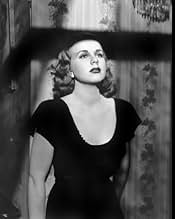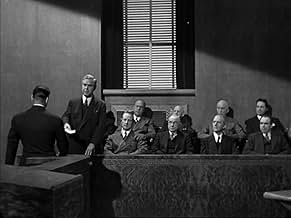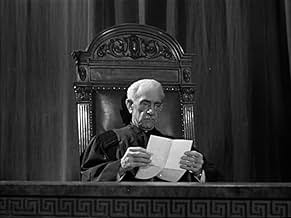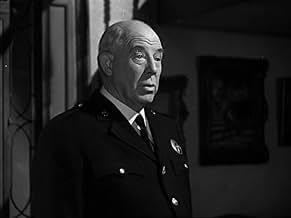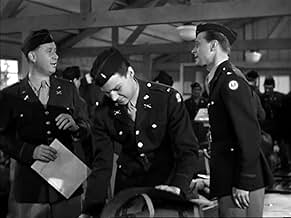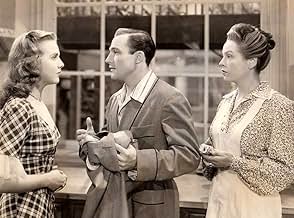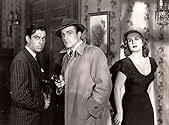NOTE IMDb
6,5/10
1,8 k
MA NOTE
Ajouter une intrigue dans votre langueA young femme-fatale realizes that the man she married is an incorrigible wastrel.A young femme-fatale realizes that the man she married is an incorrigible wastrel.A young femme-fatale realizes that the man she married is an incorrigible wastrel.
- Réalisation
- Scénario
- Casting principal
- Nommé pour 1 Oscar
- 1 nomination au total
Eddie Acuff
- Steve
- (non crédité)
Fred Aldrich
- Bartender
- (non crédité)
Frank Austin
- Jury Member
- (non crédité)
John Barton
- Concertgoer
- (non crédité)
Vangie Beilby
- Wedding Guest
- (non crédité)
John Berkes
- Waiter
- (non crédité)
Oliver Blake
- Defense Attorney
- (non crédité)
Charles Cane
- Joe
- (non crédité)
Wheaton Chambers
- Plane Passenger
- (non crédité)
Ruth Cherrington
- Concertgoer
- (non crédité)
James Conaty
- Concert Patron
- (non crédité)
Avis à la une
The two stars are Deanna Durbin and Gene Kelly so 1940's audiences seeing a title like "Christmas Holiday" may well have expected a musical. The surprise was a TKO, and people reeled under this somewhat cleansed version of the Maugham novel. A powerful drama, "Christmas Holiday" actually proves that Durbin could have been on the verge of a stellar adult career that would have included important dramatic roles. She is merely superb in this one as a 'dance hall singer-hostess' who is determined to suffer as much as her murderous, jailed, asocial husband, very well done here by Gene Kelly. Durbin sings two standards beautifully, but it is her ACTING here that boosts the attention. Robert Siodmak, one of our finest noir-ish directors, carries off this challenge with excellence. Dean Harens is an fine foil for Durbin in her quest for retribution. A Broadway actor, he sounds and acts in the Tom Drake-style, and that is a compliment. Gladys George, Gale Sondergaard, Richard Whorf work well under Siodmak. Perhaps the public wasn't ready for Durbin and Kelly as 'hostess' and 'psycopath', and that is a shame. Despite the whitewash of some of the novel's elements, this is a very very fine film, and Deanna Durbin, wherever you may be these days, you are to be sincerely commended. Thanks for this one!!
DEANNA DURBIN begged Universal to let her play a dramatic role after her great success in a string of mostly mediocre films where she played a Little-Miss-Fixit in featherweight romantic comedies who sang operatic ditties with great skill and charm. She was always involved in a scheme to reunite her mother and father for the final clinch.
Here, she handles her very adult role with competence, quite believable as a torch singer in a disreputable nightclub, a troubled woman seeking redemption for problems in her twisted past relationships with a mother and son (GALE SONDERGAARD and GENE KELLY).
Deanna shines in the role, giving it shades of both simplicity and charm while playing the happy bride, but convincing when she becomes the bruised and fragile woman who manages to tell her tale of woe to a young lieutenant. The soldier is nicely played by DEAN HARENS, an officer on Christmas leave who is on his way to San Francisco when a storm forces his plane to land in New Orleans.
The film structure is not always smooth, burdened as it is by a couple of flashbacks in the middle and a rather weak ending that is over too abruptly. But Robert Siodmak and cameraman Woody Bredell give the whole piece a fluid style with long tracking shots and superior cinematography for several key scenes, notably the one that takes place at a church service on Christmas eve, and another in a concert hall.
Durbin's fans will certainly appreciate her rendering of "Spring Will Be A Little Late This Year" and Irving Berlin's haunting ballad "Always." The background music, a mixture of popular songs and classical pieces, is effective, especially for all of the nightclub scenes. Hans J. Salter deservedly won an Oscar nomination for his detailed and meticulous score.
Effective supporting performances from GALE SONDERGAARD, GLADYS GEORGE and RICHARD WHORF strengthen the tale. Well worth watching. Oddly enough, Deanna handles her dramatic chores in much better style than Gene Kelly, who's unable to do much with his role of a weak-willed wastrel who turns to crime for reasons unexplained.
Trivia note: David Bruce has a small role at the beginning. Two years later he'd be co-starring with Deanna in much bigger parts in CAN'T HELP SINGING and LADY ON A TRAIN.
Here, she handles her very adult role with competence, quite believable as a torch singer in a disreputable nightclub, a troubled woman seeking redemption for problems in her twisted past relationships with a mother and son (GALE SONDERGAARD and GENE KELLY).
Deanna shines in the role, giving it shades of both simplicity and charm while playing the happy bride, but convincing when she becomes the bruised and fragile woman who manages to tell her tale of woe to a young lieutenant. The soldier is nicely played by DEAN HARENS, an officer on Christmas leave who is on his way to San Francisco when a storm forces his plane to land in New Orleans.
The film structure is not always smooth, burdened as it is by a couple of flashbacks in the middle and a rather weak ending that is over too abruptly. But Robert Siodmak and cameraman Woody Bredell give the whole piece a fluid style with long tracking shots and superior cinematography for several key scenes, notably the one that takes place at a church service on Christmas eve, and another in a concert hall.
Durbin's fans will certainly appreciate her rendering of "Spring Will Be A Little Late This Year" and Irving Berlin's haunting ballad "Always." The background music, a mixture of popular songs and classical pieces, is effective, especially for all of the nightclub scenes. Hans J. Salter deservedly won an Oscar nomination for his detailed and meticulous score.
Effective supporting performances from GALE SONDERGAARD, GLADYS GEORGE and RICHARD WHORF strengthen the tale. Well worth watching. Oddly enough, Deanna handles her dramatic chores in much better style than Gene Kelly, who's unable to do much with his role of a weak-willed wastrel who turns to crime for reasons unexplained.
Trivia note: David Bruce has a small role at the beginning. Two years later he'd be co-starring with Deanna in much bigger parts in CAN'T HELP SINGING and LADY ON A TRAIN.
If you want to see a film version of Somerset Maugham's "Christmas Holiday", you'll have to wait a while. This isn't it, despite the credit. "Suggested by..." would have been a more accurate credit. Maugham's tale is set in prewar Paris and concerns a young English college student who goes to Paris to see the sights during his Christmas vacation. This film updates the action to WW2 and concerns a lieutenant just graduated from flight school on leave to get married in San Francisco. Grounded by bad weather in New Orleans, he receives a telegram from his fiancée announcing her marriage to some other cluck. He decides to continue to S.F., presumably bent on vengeance. From here on film and Maugham more less parallel each other in broad outline, but all of Maugham's discussions between the student and his radical journalist friend about politics, sex, society and other more or less tabu topics in 1944 Hollywood are eliminated. In the film, the journalist is a pestiferous, drunken ne'er-do-well who frequently acts as a pimp for Gladys' dive. In the original story, Deanna's character, named Sonya, is a Russian émigré forced into prostitution to support herself and her sociopathic lover. Stripped of all of Maugham's philosophical thrust, we have just another film-noir/weeper, although it's not too bad in many respects. Not to reveal the melodramatic denouement tacked on by Hollywood, I'll only say that Maugham's story ends without any resolution, except possibly the student's regret that after being introduced to Sonya, he didn't see Paris, and all he got out of Sonya was conversation. In that, film and story agree.
Well, there you are! Somerset Maugham's "Christmas Holiday" indeed! But it's not as bad as some critics declare. Pauline Kael didn't like it, of course. But it is interesting as a film noir, and Deanna's first, perhaps only real, chance at a dramatic vehicle. Helen Hayes, or even Jane Greer, she wasn't, but then it's doubtful that Universal ever made any effort to develop her acting talent beyond the merest fundamentals. Also she didn't have the long film background of a Helen Parrish. She does present a winsome, sympathetic girl plunged into bad circumstances when her attractive husband proves a murderer and general bad type. Added to that, her mother-in-law casts her out after the husband's conviction. It's not a great performance, but Hollywood has produced many worse. Gene Kelly and the rest of the cast are very good. Kelly is in a very early role, the others are mostly veterans. It's a very moody piece, with photography to suit, and not at all what you would have gotten if Maugham's real story had been filmed.
Oh, yes. Deanna gets to sing two songs. Early on we get "Spring will be a little late this year", which is a slightly jazzy torch song, and later in the film, "Always", beautifully and wistfully delivered by Deann.
Well, there you are! Somerset Maugham's "Christmas Holiday" indeed! But it's not as bad as some critics declare. Pauline Kael didn't like it, of course. But it is interesting as a film noir, and Deanna's first, perhaps only real, chance at a dramatic vehicle. Helen Hayes, or even Jane Greer, she wasn't, but then it's doubtful that Universal ever made any effort to develop her acting talent beyond the merest fundamentals. Also she didn't have the long film background of a Helen Parrish. She does present a winsome, sympathetic girl plunged into bad circumstances when her attractive husband proves a murderer and general bad type. Added to that, her mother-in-law casts her out after the husband's conviction. It's not a great performance, but Hollywood has produced many worse. Gene Kelly and the rest of the cast are very good. Kelly is in a very early role, the others are mostly veterans. It's a very moody piece, with photography to suit, and not at all what you would have gotten if Maugham's real story had been filmed.
Oh, yes. Deanna gets to sing two songs. Early on we get "Spring will be a little late this year", which is a slightly jazzy torch song, and later in the film, "Always", beautifully and wistfully delivered by Deann.
I was lucky enough to catch a rare screening of this never-on-video film at the Cinematheque here in Hollywood last night. It was very beautiful, moving even, with lovely black-&-white cinematography by Woody Bredell. Other users' comments to the contrary, Gene Kelly's role is most definitely not insignificant - he's the villain, for crying out loud! His genuinely complex and subtle performance is a real standout in a film filled with wonderful work by all of the actors. Gale Sondergaard, also, is clearly well-cast, too, as Kelly's mother; she may have been a little young for the role in real life, but that certainly doesn't come across in her portrayal of the stifling, weak-willed, coddling mother of a killer. Deanna Durbin, though always more of a performer than an actor per se, is more than convincing as a world-weary singer in a whorehouse (not a night club; though it's never explicitly identified as a house of ill repute, only the most boneheaded viewer would take it for anything else). Her tearful breakdown in the church during Christmas Eve mass (an exquisitely rendered set piece, full of deep, soft shadows and luminous pools of communal light) is genuinely touching and heartfelt. And the film's final moments, if accepted unironically (as they were intended), are truly poetic and uplifting.
What a surprise treat to see this rare film as part of a Robert Siodmak Festival at the Cleveland Art Museum in the summer of 2014. It put me back in the mid-WWII period and the beautiful, pristine 35mm print was shown as originally presented on the big screen, thanks to Film Curator John Ewing.
The major attraction here is that Deanna Durbin and Gene Kelly both play against type in a "doctored up" Somerset Maugham story. Siodmak direction is dark, atmospheric and smoothly executed throughout. Deanna sings Irving Berlin's "Always" in a pop style very effectively. A good portion of Wagner's "Liebestod" from Tristan and Isolde is heard in an orchestral setting to heighten the dramatic proceedings.
Both stars work surprisingly well in their very heavy roles, and I found myself glued to the screen during Durbin's depiction. Her acting style has often been subtle, and this performance was one of her most understated. Kelly's role challenged him to reach dramatic heights, and he rises to occasion.
While some of the script is dated, Deanna dominates the screen whenever she's on, and is matched by a fine supporting cast. Truly a worthwhile viewing.
The major attraction here is that Deanna Durbin and Gene Kelly both play against type in a "doctored up" Somerset Maugham story. Siodmak direction is dark, atmospheric and smoothly executed throughout. Deanna sings Irving Berlin's "Always" in a pop style very effectively. A good portion of Wagner's "Liebestod" from Tristan and Isolde is heard in an orchestral setting to heighten the dramatic proceedings.
Both stars work surprisingly well in their very heavy roles, and I found myself glued to the screen during Durbin's depiction. Her acting style has often been subtle, and this performance was one of her most understated. Kelly's role challenged him to reach dramatic heights, and he rises to occasion.
While some of the script is dated, Deanna dominates the screen whenever she's on, and is matched by a fine supporting cast. Truly a worthwhile viewing.
Le saviez-vous
- AnecdotesBecause of the Hays Code, screenwriter Herman J. Mankiewicz changed the setting from a Paris brothel to a nightclub in New Orleans, and changed the main character from a prostitute to a more ambiguous nightclub singer and hostess, in adapting the 1939 novel of the same name by W. Somerset Maugham.
- GaffesAfter Robert breaks out of jail, the newspaper spells his last name as "Mannette". However, the correct spelling is "Manette".
- Citations
Simon Fenimore: [to Charles] The planes are all grounded, the trains won't do you any good, and you're too big for me to carry on piggyback.
- ConnexionsReferenced in Go, Johnny, Go! (1959)
Meilleurs choix
Connectez-vous pour évaluer et suivre la liste de favoris afin de recevoir des recommandations personnalisées
- How long is Christmas Holiday?Alimenté par Alexa
Détails
- Date de sortie
- Pays d’origine
- Langue
- Aussi connu sous le nom de
- Christmas Holiday
- Lieux de tournage
- St Vibiana RC cathedral, Main St, Los Angeles, Californie, États-Unis(midnight mass scene)
- Société de production
- Voir plus de crédits d'entreprise sur IMDbPro
- Durée1 heure 33 minutes
- Couleur
- Rapport de forme
- 1.37 : 1
Contribuer à cette page
Suggérer une modification ou ajouter du contenu manquant

Lacune principale
By what name was Vacances de Noël (1944) officially released in India in English?
Répondre

